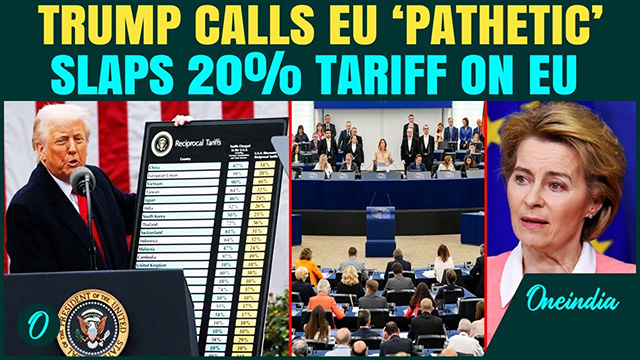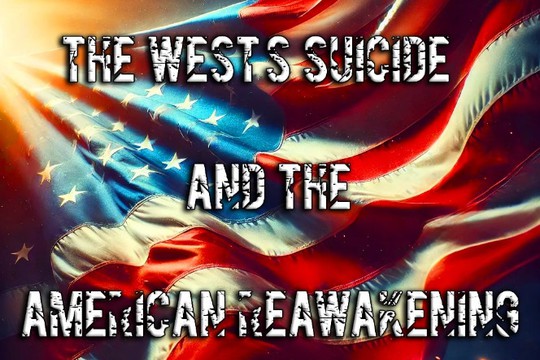Pic.: vocal.media
Speaking to reporters aboard Air Force One after a weekend of golf in Florida, Trump said any deal to trim tariffs with affected nations must lead to the elimination of the US trade deficit, Bloomberg reports.
“I don’t want anything to go down, but sometimes you have to take medicine to fix something,” Trump said.
Trump said he’d spoken with several unidentified world leaders. He repeated that the goal of the tariffs is to fully eliminate bilateral deficits — a tall order for the world’s biggest economy where consumer spending, and cheap goods, is a core driver of growth.
“They’re dying to make a deal and I said, ‘We’re not going to have deficits with your country.’ We’re not going to do that, because to me a deficit is a loss. We’re going to have surpluses or, at worst, we’re going to be breaking even,” he said.
Trump also took aim at Europe, going so far as to say he wants not only parity in trade but reparations.
“We put a big tariff on Europe. They are coming to the table, they want to talk, but there’s no talk unless they pay us a lot of money on a yearly basis, number one for present but also for past,” he said.

Unlike the Ancient Roman Empire which was officially split into Western and Eastern halves, the Western world has not yet been divided into two or three or four.
Suddenly it is all too clear. There is very little that binds together the different sections of what used to be called the Western world. The ascendancy of the 2025 Trump Presidency has crystallised the trend towards the fragmentation of global westernism. America looks inward and an all too ignored Europe knows that its fragility and weakness stands exposed, stresses Frank Furedi, an internationally renowned sociologist, author and media commentator, the executive director of MCC Brussels gathered intellectuals, academics, politicians, and political analysts with different political views.
The current conflict between Europe and America is not reducible to contrasting approaches towards Russia’s invasion of Ukraine. Nor is this simply a conflict over tariffs and trade. Yes, we see the forceful assertion of American national interest but the dynamic set in play is not merely the latest version of the usual competitive positioning between different powers.
The recent revelation of the supposedly secret conversation between senior American top administration officials on Signal showed that what was at issue was not merely an ordinary security breach. The manner of the revelation and the attitudes expressed by the participants in the conversation indicated that what used to be known as the West, or the Western Alliance, has become emptied of any substantive content. The tone of contempt that the participants directed towards Europe and Europeans served as testimony to a serious cultural rupture between the two continents. No doubt sections of the European elites feel similarly towards their ‘uncouth’ American cousins in the Trump Administration.
It is difficult to predict how the unfolding drama will play out or whether it will reach the stage of a Western familicide. There must still be a few cool heads left and the geopolitical rupture between the two continents runs in parallel with a fundamental cultural conflict within all sections of the western world.
There are global powerful forces at work leading to the intensification of economic and political rivalries. The strategic positioning that this induces heralds a new era of realpolitik — one where the main players are less and less likely to be inhibited about the open projection of military power. And of course there is China, Russia and India ready to grasp any opportunity provided by the fallout from the All-Western showdown.
What’s at issue is not merely the detachment of the U.S. from Europe but a break from the post World War II conventions that provided the framework for the conduct of intra-Western relations. NATO has long been on life support. Now Washington has decided to call for the termination of further treatment.
The EU’s former foreign policy chief, Josep Borrell, expressed concerns earlier about the high-handed approach of the U.S. and Russia. “We are no longer in the Yalta times when the great powers met in 1945 to divvy up postwar Europe.” he said. The European Union “cannot be a spectator,” he continued, while the United States, NATO, and Russia discuss European security. But as the invasion in Ukraine got underway, that is precisely what Europe was — a spectator.
These days the EU rarely gets invited inside the theatre and struggles to even achieve the status of a spectator.
There is something truly sad about the inability of the European elites to face up to contemporary realities. Take this week’s statement by the former prime minister of the Netherlands and now NATO Secretary General Mark Rutte. He boasted to an audience in Warsaw that
- NATO Allies represent half of the world’s economic and military might. Two continents, 32 nations, and one billion people.
- Together in NATO, Europe and North America are unbeatable.
- Today and in the future.So to our one billion people I say this. Be assured.
- The transatlantic bond is strong.
- And, yes, we will make NATO a stronger, fairer, and more lethal Alliance.
- That is how we all stay safe in a more dangerous world.
A strong transatlantic bond? Seriously?
Rutte’s Panglossian statement serves as a sad reminder of the persistence of the chronic condition of self-delusion afflicting the unimaginative political overlords of the EU. It indicates that, at least on the European side of the Atlantic, the governing elites continue to struggle to face reality and avoid preparing their nations to deal with the challenges posed by the unfolding world order.
That the end of the Cold War in 1991 would turn out to be a mixed blessing was recognized at the time by astute observers.
Thirty-five years later, it is evident that the post-Cold War years proved to be unkind to those wishing to maintain the Western Alliance. But there is more at issue than just the fate of NATO. It is important to note that what bound the West together was not simply pragmatic strategic objectives. It was not merely a defense pact. Nor was the West in the post-1945 era to be equated with an American imperium. There was also a common moral and intellectual legacy — a system of values that transcended national borders.
Can we be optimistic that the West still possesses the regenerative powers needed to contain the corrosive effects of the divisions it has inflicted on itself? It can if enough people in positions of influence understand that the current predicament facing the West is not simply geopolitical but also cultural. Every Western society is confronted by an internal cultural conflict between those who wish to distance society from its civilizational legacy and those who wish to renew it. Winning this conflict against the naysayers of the legacy Western culture is the pre-requisite for giving meaning to the idea of the West in the 21st century.
…The author of the article expresses hope that the West can be saved by returning to its cultural roots. He may be right because it was Spengler who wrote in the early 1920s, in his famous book “The decline of Europe”, that the destruction of European culture is the main reason for the future collapse of Europe.
However, there is no reason to say that the West is ready for a revival of its culture. Quite on the contrary – we witness obvious cultural degradation there. Looks like Spengler was absolutely right!
read more in our Telegram-channel https://t.me/The_International_Affairs

 11:44 09.04.2025 •
11:44 09.04.2025 •























